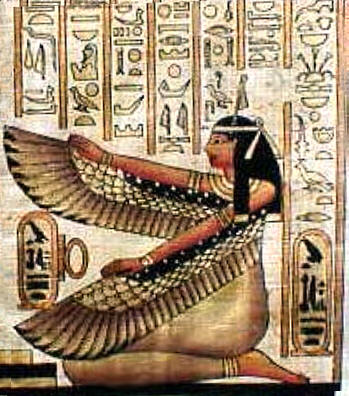Maat (literally means "truth") is the Egyptian goddess who represented the ethical and moral principle that every Egyptian citizen was expected to follow throughout their daily lives. They were expected to act with honor and truth in manners that involve family, the community, the nation, the environment, and god.
Maat embraced all aspects of existence, including the basic equilibrium of the universe, the cycle of the seasons, heavenly movements, religious obser-vations and fair dealings, honesty and truthfulness in social interactions.
The ancient Egyptians had a deep conviction of an underlying holiness and unity within the universe. Cosmic harmony was achieved by correct public and ritual life. Any disturbance in cosmic harmony could have consequences for the individual as well as the state. An impious king could bring about famine or blas-phemy blindness to an individual. In op-

The ancient Egyptian goddess Ma'at
position to the right order expressed in the concept of Maat is the concept of chaos, lies and violence.
Few would claim there a Goddess Ma'at. It is shame the world no longer believes in such a power. for universal belief in such a being produces a healthy, peaceful and prosperous society.
For centuries, the threat of God's wrath was sufficient to produce a stable and reasonably healthy society in the Western world. Then society got to smart to believe in such a being, and now we are beset with chaos, lies and violence.
We have become too wise to believe in a Universal morality. And because of this we have no shared morality. Some believe one way is correct, others believe in another. Hence chaos and violence. Short of a worldwide despotic government, there is no solution.
T